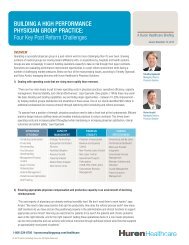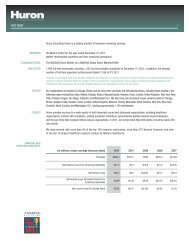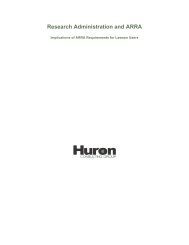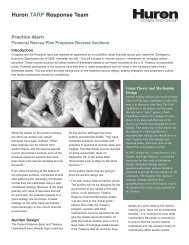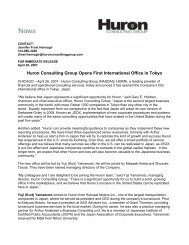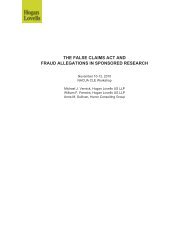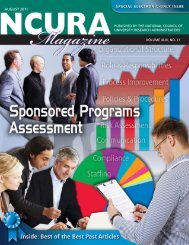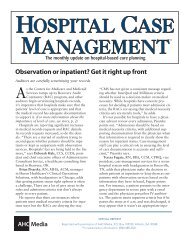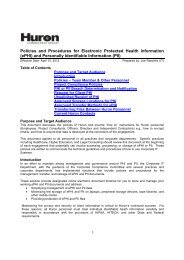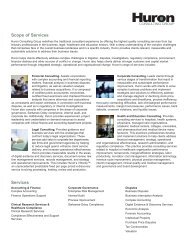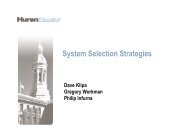2004 Annual Review of Financial Reporting Matters - Huron ...
2004 Annual Review of Financial Reporting Matters - Huron ...
2004 Annual Review of Financial Reporting Matters - Huron ...
You also want an ePaper? Increase the reach of your titles
YUMPU automatically turns print PDFs into web optimized ePapers that Google loves.
Defining the "F" in CFO – is it for<br />
"finance" or "financial"<br />
The role <strong>of</strong> the chief financial <strong>of</strong>ficer has<br />
evolved in corporate America. Surveys<br />
indicate that today's CFOs spend more<br />
time on "deals" and "strategy" than on<br />
financial reporting. While having a<br />
finance wiz and visionary may be what<br />
the CEO and board<br />
desires, it may not be<br />
aligned with the<br />
investing public's<br />
expectations <strong>of</strong> today's<br />
chief "financial" <strong>of</strong>ficer.<br />
Investors look to the<br />
CFO as the individual<br />
with primary<br />
responsibility for the<br />
company's financial<br />
reporting in accordance<br />
with GAAP, which many<br />
would argue is a fulltime<br />
endeavor.<br />
Some companies have already<br />
addressed elements <strong>of</strong> this "expectation<br />
gap" by elevating the most senior<br />
accounting pr<strong>of</strong>essional to a "C" level<br />
position, through the creation <strong>of</strong> the<br />
Chief Accounting Officer position. While<br />
such a move doesn't ensure that a<br />
registrant will be free from accounting<br />
problems, it does display the appropriate<br />
level <strong>of</strong> importance that financial<br />
reporting requires in the executive suite.<br />
Further clarity in these responsibilities<br />
will benefit senior finance and accounting<br />
executives in meeting their job<br />
responsibilities.<br />
It's not just about systems – getting<br />
the people part right counts, too.<br />
Automation and systems may have<br />
removed much <strong>of</strong> the labor component<br />
from the manufacturing sector, but<br />
financial reporting still requires human<br />
judgment and analyses in which there is<br />
no substitute for competent accounting<br />
and financial reporting experts.<br />
Attracting and retaining the right people<br />
is one <strong>of</strong> the most critical aspects <strong>of</strong><br />
quality financial reporting and is a<br />
challenge that new rules, regulations, or<br />
technologies can't solve. Having a<br />
"This is the reason there is<br />
SOX 404. These reports are<br />
akin to termites coming out<br />
<strong>of</strong> the woodworks – you<br />
would have never known<br />
they were there…Interesting<br />
SOX did not mandate a<br />
single addition[al] control<br />
and yet now we are learning<br />
<strong>of</strong> ones that did not exist."<br />
Lynn E. Turner,<br />
former Chief Accountant, SEC<br />
sufficient number <strong>of</strong> people with the right<br />
experience and expertise in the<br />
accounting and finance department is<br />
something that will be scrutinized by<br />
registrants during their internal control<br />
tests and reports under SOX 404.<br />
According to a January 11, 2005 article<br />
by Compliance Week, 582 companies<br />
disclosed material<br />
weaknesses or<br />
significant deficiencies<br />
in their internal controls<br />
in <strong>2004</strong>. <strong>Financial</strong><br />
systems and<br />
procedures (50.1% on<br />
average) were cited as<br />
the primary weakness,<br />
followed by personnel<br />
issues (29.6% on<br />
average).<br />
Companies can no<br />
longer afford to view the accounting<br />
department as a cost center to be<br />
contained. An<br />
accounting<br />
department staffed<br />
with personnel who<br />
have welldeveloped<br />
technical skills<br />
should be viewed<br />
as part <strong>of</strong> a<br />
company's risk<br />
management<br />
program. After all, it<br />
is less expensive to<br />
pay to attract the<br />
right talent today<br />
than it is to defend<br />
against the<br />
inevitable torrent <strong>of</strong><br />
lawsuits and<br />
investigations that<br />
commence if<br />
significant<br />
accounting<br />
deficiencies surface.<br />
Board changes and activities: Take<br />
a look inside.<br />
"I suspect that the costs [<strong>of</strong><br />
implementing Section 404]<br />
are not easy to estimate, but<br />
I know that it is even tougher<br />
to quantify the benefits.<br />
However, given the massive<br />
financial scandals, decline in<br />
market capitalization and<br />
resulting loss <strong>of</strong> investor<br />
confidence in our markets, I<br />
believe that, <strong>of</strong> all <strong>of</strong> the<br />
recent reforms, the internal<br />
control requirements<br />
have the greatest potential<br />
to improve the reliability <strong>of</strong><br />
financial reporting."<br />
Donald T. Nicolaisen,<br />
Chief Accountant, SEC<br />
Keynote Speech at 11th <strong>Annual</strong><br />
Midwestern <strong>Financial</strong> <strong>Reporting</strong><br />
Symposium, October 7, <strong>2004</strong><br />
Thanks to an analysis entitled,<br />
"Corporate Governance Practices <strong>of</strong> the<br />
100 Largest U.S. Public Companies" by<br />
the law firm Shearman & Sterling LLP,<br />
we are able to review the changes and<br />
activities <strong>of</strong> the boards <strong>of</strong> directors for<br />
the largest 100 companies in the United<br />
States, as reported during the <strong>2004</strong><br />
proxy season.<br />
The Shearman & Sterling LLP report<br />
includes the following highlights:<br />
Independent Directors<br />
NYSE & NASDAQ require that boards<br />
have at least a majority <strong>of</strong> independent<br />
directors, but 46 <strong>of</strong> the top 100<br />
companies have adopted even more<br />
stringent standards. Independent<br />
directors comprise at least 75 percent <strong>of</strong><br />
the board at 81 <strong>of</strong> the top 100<br />
companies. At 35 <strong>of</strong> the top 100<br />
companies, the CEO is the only nonindependent<br />
director.<br />
<strong>Financial</strong> Experts<br />
SEC rules require companies to disclose<br />
whether they have a financial expert on<br />
their audit committee, and if so, who it is.<br />
Per the analysis, 42 <strong>of</strong> the top 100<br />
companies indicated that they<br />
had more than one financial<br />
expert on their audit<br />
committee, and <strong>of</strong> these 42,<br />
17 disclosed that their entire<br />
audit committee was<br />
comprised <strong>of</strong> financial<br />
experts.<br />
Meetings<br />
According to the report, full<br />
boards met only slightly more<br />
in 2003 than in 2002.<br />
However, committee<br />
meetings did become more<br />
frequent during this period.<br />
There was a notable increase<br />
in the number <strong>of</strong> companies<br />
reporting more frequent audit,<br />
governance/nominating and<br />
compensation committee<br />
meetings.<br />
Multiple Boards<br />
According to the report, 29 <strong>of</strong> the top 100<br />
companies placed limits on the number <strong>of</strong><br />
boards on which their directors could<br />
serve. However, most <strong>of</strong> those 29<br />
approved exemptions for board members<br />
as <strong>of</strong> the enactment dates. Interestingly,<br />
47 <strong>of</strong> the top 100 companies have<br />
<strong>Huron</strong> Consulting Group | 15



